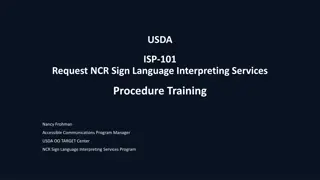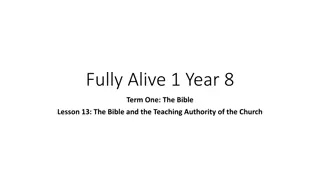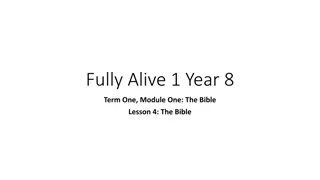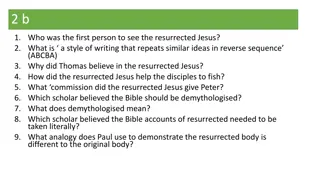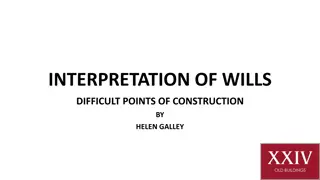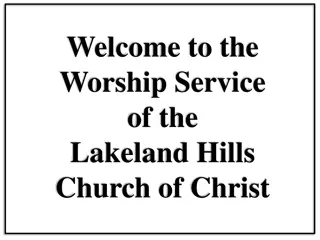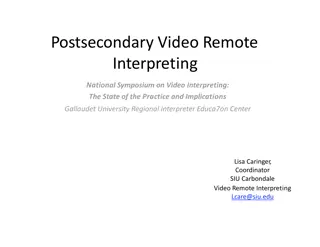
Proper Biblical Interpretation Principles
Learn the foundational principles for interpreting the Bible accurately, including its divine inspiration, the importance of context, gathering and handling scriptural evidence correctly, and applying its message to your life. Discover significant distinctions that must be made to interpret and understand the Bible effectively.
Download Presentation

Please find below an Image/Link to download the presentation.
The content on the website is provided AS IS for your information and personal use only. It may not be sold, licensed, or shared on other websites without obtaining consent from the author. If you encounter any issues during the download, it is possible that the publisher has removed the file from their server.
You are allowed to download the files provided on this website for personal or commercial use, subject to the condition that they are used lawfully. All files are the property of their respective owners.
The content on the website is provided AS IS for your information and personal use only. It may not be sold, licensed, or shared on other websites without obtaining consent from the author.
E N D
Presentation Transcript
Lesson 5: Interpreting the Bible (Part 1)
Interpreting the Bible I. The Bible Is Inspired of God, and God Expects Man to Interpret It Properly. A. The Bible is a supernatural revelation from God. 1. It is inspired and therefore infallible. 2. It is authoritative. 3. It is all-sufficient. 4. It has been delivered once for all. 5. It is enduring and unbreakable. 6. It is absolute truth. 7. It is not to be: Added to; Subtracted from; Modified. 8. It can be understood. 9. It can be understood correctly. 10.It can be understood alike. 11.It is reasonable. 12.It is relevant to our lives today.
Interpreting the Bible I. The Bible Is Inspired of God, and God Expects Man to Interpret It Properly. B. God expects man to interpret the Bible properly (i.e., in the way that He intended). 1. Since there is one God, who gave one book, to last for all time, to save all people, and to do so in the same way, how many different acceptable ways would He give to interpret that one book? Would He expect man to interpret it differently or the same? 2. Second Timothy 2:15 is God s key to interpreting God s Word in God s way.
Interpreting the Bible II. There Are Some Basic Principles for Properly Interpreting and Understanding the Bible. A. Study the content of each individual passage. B. Study the context of each individual passage. 1. The Literary Context 2. The Immediate Context 3. The Specific Book Context 4. The Specific Author Context 5. The Parallel Passage Context 6. The Biblical Context 7. The Historical-Cultural Context 8. Keeping a passage in its context is absolutely critical to sound Biblical interpretation.
Interpreting the Bible II. There Are Some Basic Principles for Properly Interpreting and Understanding the Bible. C. Gather all the relevant Scriptural evidence on any Biblical subject. D. Handle the gathered evidence correctly. 1.Exegesis must come first. 2.Eisegesis must be avoided. 3.Hermeneutics (the interpretation) must come second. E. To fail to follow these steps: (1) studying the content, (2) studying the context, (3) gathering all the relevant Scriptural evidence, and (4) handling the gathered evidence correctly, 1.Means the Bible can be made to mean whatever. F. Then, apply the message of the Bible to your life.
Interpreting the Bible III.Significant Distinctions Must Be Made to Properly Interpret and Understand the Bible. A. We must distinguish between the Patriarchal, Mosaic/Jewish and Christian Ages. B. We must distinguish between the Old Testament and the New Testament. C. We must distinguish between the merely reported and the authorized. D. We must distinguish between circumstance and condition. E. We must distinguish between the temporary and the permanent. F. We must distinguish between faith and opinion. G. We must distinguish between custom and law.
Interpreting the Bible IV.Rational Reasoning Is Required for Properly Interpreting and Understanding the Bible. A. Every student of the Bible functions as either rational or irrational. B. The Bible demands that men be rational. 1. The Bible plainly teaches that we can prove and therefore know: 2. Men must recognize the proper role of reason in connection with Biblical evidence. 3. Jesus is our perfect example of approaching the Bible rationally and providing a reasoned defense thereof (Matt. 4:1-11). C. Christianity is a religion of rational reasoning based upon Biblical authority.
Interpreting the Bible V. The Necessity for Authority in Religious Matters (And Knowing How the Bible Authorizes) Cannot Be Overemphasized! A. It is imperative that we be concerned about Bible authority and how to ascertain it. B. Authority (an objective standard) is absolutely necessary in religious matters. 1. There is an obvious need for an objective standard in ordinary affairs. 2. In the same way, an objective standard is absolutely crucial to properly answering questions which pertain to man s salvation from sin. 3. God has made it abundantly clear that the only belief or action (in religion) which is acceptable to Him is that which is authorized by His word. C. The Bible is the true (and only) standard, as the authority it possesses comes ultimately from the all-authoritative God. Understanding the chain of authority is vital.
Interpreting the Bible V. The Necessity for Authority in Religious Matters (And Knowing How the Bible Authorizes) Cannot Be Overemphasized! D. The New Testament is the Divine pattern for us today. E. God will not tolerate that which is not authorized. 1. Whatever is not authorized by God is not acceptable to God, even if it is intended to be acceptable. 2. The Bible often uses the word strange in the sense of not acceptable because not authorized. F. We must know how God does not authorize. G. We must stand on authorized Bible truth and avoid the destructiveness of extremes. H. God demands Biblical authority for a Christian s work and worship. I. Unless we know how God (or the Bible) authorizes, we cannot be sure about anything we do or say in the realm of religion.



